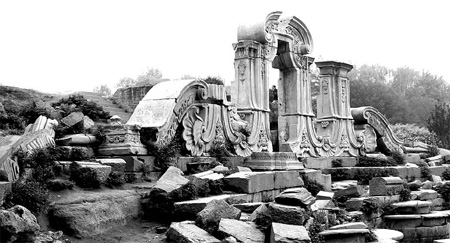Focus
Documenting the past key to repatriation
By Qin Zhongwei (China Daily)
Updated: 2010-03-11 11:30
 |
Large Medium Small |
Although Chen Mingjie, director of the Yuanmingyuan Administrative Office, has said on various occasions that the team of eight historians and experts on cultural relics protection who visited the United States last December were on a scholarly trip, it was still interpreted by the domestic and foreign media as a hunt for treasures looted from the Old Summer Palace.
Whatever its purpose it highlights one thing, getting any of the artifacts back is likely to prove extremely difficult for the 150-year-old royal garden.
|
 Ruins of the Old Summer Palace. Xie Zhengyi / For China Daily |
During their 18-day stay in the US between Nov 29 and Dec 16, the team of professors, staff from the park's publicity department and the cameramen from CCTV recording the visit, toured nine museums in Washington, New York and Boston, as part of an attempt to build a complete database of the Old Summer Palace's lost relics.
While there was no eureka moment, the team did discover and photograph several relics from the garden that were previously unknown to the Chinese authorities, including a painting dating back to the Song Dynasty (960 to 1279), according to Chen. Previously part of the garden's collection, the painting is currently on display in the Boston Museum.
Chen believes the trip was a very fruitful one, as the team discovered several hundred old photographs and pictures of the historic garden and other parks, and some valuable records made by western scholars. "These documents will definitely help build a clearer view of the Old Summer Palace before it was looted and burned down in 1860 by invading British and French troops," he said.
Former archives at the Old Summer Palace documenting all the artworks and treasures were destroyed in the 1860 attack according to Wang Daocheng, a scholar on the history of the Old Summer Palace and the Qing Dynasty at the Renmin University of China, who was interviewed last year by The Beijing Review.
"If overseas museums and libraries assist us, we could work out a comparatively complete catalog of the palace's overall collection, how many of them have survived the fire, and where they are now," Wang was quoted as saying.
This explains why the team made the US its first port of call, rather than Britain and France.
"For a complete catalog, we need to see the items, but we will be more reliant on historical documents," Chen said.
Chen has said in earlier conversations with the media that what is so far known about the plundered treasures is still "the tip of the iceberg". But trying to get support from the foreign institutions for the planned database has raised tensions, as any actions associated with seeking the cultural relics have become quite sensitive.
In recent years, China has been actively seeking the return of overseas relics. But unlike Greece and Egypt, which have sought, with some success, to recover antiquities from museums in Europe and the US, China's repatriation through legal means has never been smooth.
| ||||
And so for Chen's team, their efforts to build a complete database continue. After their trip to the US, the team is going to Japan and Europe this year to continue their search. "The long journey has just started," Chen said.
Recovering relics requires diplomacy, law
To retrieve cultural relics that were looted and are now overseas, the Chinese government and the people should maintain a rational attitude, said Xie Xinsheng, an international law expert from the Chinese Academy of Social Sciences. The best way to repatriate the artifacts is to pursue a strategy that combines both legal and diplomatic efforts, he said.
A combined effort with other countries in a similar position is the best course of action he believes, and he suggests that China should first strengthen its cooperation with other countries like Italy or Egypt, which have similar claims.
China should also strengthen its laws and regulations so as to combat domestic theft and smuggling, and the illegal excavation of cultural relics within its borders, as this will also help win support when China continues its repatriation work overseas, Xie wrote in a paper, named International Law Issues Relating to Repatriation of Chinese Royal Cultural Relics looted Overseas.
Xie also proposes that the Chinese government should mobilize its strength and resources to establish a special institution or organization to take charge of the repatriation work. The new body could establish policies for rewarding those who return China's antiques, as well as document the treasures held by countries and individuals around the world.
metro








